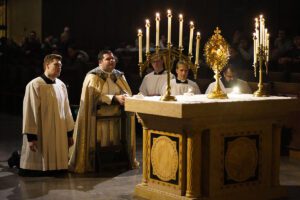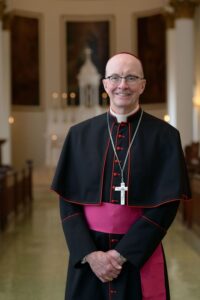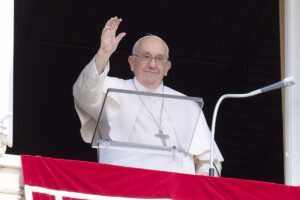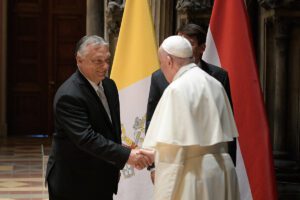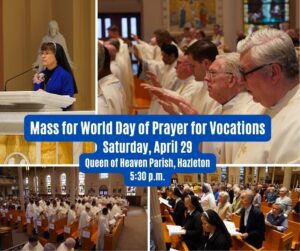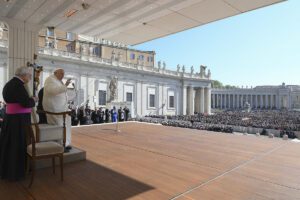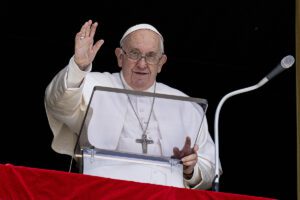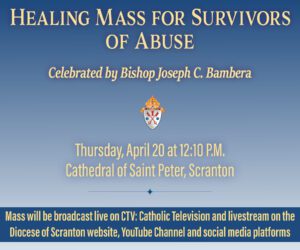VATICAN CITY (CNS) – At least three dozen women will be voting members of the assembly of the Synod of Bishops in October, Pope Francis has decided.
In a decision formalized April 17, “the Holy Father approved the extension of participation in the synodal assembly to ‘non-bishops’ — priests, deacons, consecrated men and women, lay men and women,” the synod office said in a statement April 26.
Cardinal Jean-Claude Hollerich, relator general of the synod, told reporters April 26 that about 21% of the synod’s 370 members would not be bishops and at least half of that group would be women.
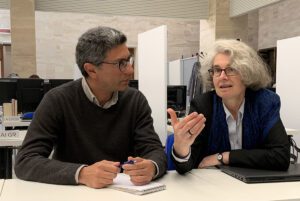
Adding women and young people to the membership will make sure “the church is well represented” in the prayer and discussions scheduled for Oct. 4-29 at the Vatican, the cardinal said. “It will be a joy to have the whole church represented in Rome for the synod.”
“As you can see, the space in the tent is being enlarged,” Cardinal Mario Grech, synod secretary-general, told reporters, echoing the title that had been chosen for the working document for the just-completed continental phase of the synod. The document said that in local and national synod listening sessions there were consistent questions about how to promote greater inclusion in the Catholic Church while staying true to church teaching.
“The Synod of Bishops will remain a synod of bishops,” Cardinal Grech said, but it will be “enriched” by representatives of the whole church.
The pope’s decision to expand the categories of synod members, the April statement said, “is in continuity” with the Catholic Church’s growing understanding of the synodal dimension of the church and “the consequent understanding of the institutions through which it is exercised.”
Since the Synod of Bishops was reinstituted after the Second Vatican Council, the voting members of the synod have all been men. The membership was primarily cardinals and bishops, except for the 10 priests — and recently one religious brother — elected by the men’s Union of Superiors General.
Now, rather than the Union of Superiors General selecting 10 voting members, the office said, it will elect only five priests or brothers. And the women’s International Union of Superiors General also will elect five sisters or nuns.
Past synods have included women as non-voting “auditors,” a group that included many women.
Pope Francis has done away with the “auditor” category of synod participant, the Vatican said. Instead, there will be a group of 70 non-bishop members representing “various groupings of the faithful of the people of God,” including priests, consecrated women, deacons and laypeople from every part of the world.
The pope will choose the 70 from a list of 140 people selected by bishops and organizers of six regional groupings of bishops and by the Assembly of Patriarchs of Eastern Catholic Churches. The six regional groups are: the council of bishops’ conferences of Latin America and the Caribbean, known as CELAM; the Council of Bishops’ Conferences of Europe; the Symposium of Episcopal Conferences of Africa and Madagascar; the Federation of Asian Bishops’ Conferences: the Federation of Catholic Bishops’ Conferences of Oceania; and the U.S. Conference of Catholic Bishops and the Canadian Conference of Catholic Bishops together.
Each of the seven bishops’ groups will nominate 20 people, the statement said, and “it is requested that 50% of them be women and that the presence of young people also be emphasized.”
In addition to the 10 religious elected by their groups of superiors and the 70 non-bishop members nominated by continental groups, Pope Francis may include “non-bishop members” among the members he appoints.
And, since the leadership of the synod secretariat will be full members, that includes Xavière Missionary Sister Nathalie Becquart, undersecretary of the synod. Cardinal Hollerich added that after all the work they did preparing the synod, “it would be very unfair” to exclude them as members.
Most synod members will be bishops elected by their episcopal conference or by their Eastern Catholic bishops’ synod. The number of delegates each conference can elect depends on the size of the conference. Bishops’ conferences with more than 200 members — like the conferences of Italy, Brazil and the United States — will elect five members.
Being guided by “mission over maintenance,” our Parish Pastoral and Finance Councils will continue to work with the Diocese of Scranton in fulfilling the Mission Statement of Vision 2030 and will utilize the Vision 2030 Blueprint Process as a “proactive initiative focused on being as responsive as possible to the mission of the Church.”
FORWARD TOGETHER IN FAITH
May 13-14, 2023
Our Lady of Fatima Parish
St. Mary of the Immaculate Conception Church
Saint Nicholas Parish
St. Nicholas Church
In July 2021, the parish communities of Our Lady of Fatima at Saint Mary’s Church and Saint Nicholas came together in a linkage. Since then, we have been focused on how best to move our faith-filled communities forward given several priority drivers. These include a 26-percent drop in the total number of registered parishioners over the last decade, a $1.7 million outstanding assessment debt of Our Lady of Fatima Parish, and a facilities assessment of the deferred maintenance of the buildings and grounds at Our Lady of Fatima Parish that exceeds $800,000 in total.
There has been a significant change in the demographics of the greater Wilkes-Barre community. As a point of reference, in 1968, Wilkes-Barre had 20 parishes served by 50 priests. The city now has five parishes with only five priests. Over the last 100 years, the city’s population has effectively been reduced by 50-percent. Between 2018 and 2022, Our Lady of Fatima Parish has seen a 54-percent decline in its number of parishioners and the average attendance at weekend Mass decreased 46-percent during the same five-year time period.
The parish offertory at Our Lady of Fatima has also continued to steadily decline from 2018 to 2022. The parish does not do a significant amount of fundraising and has been unable to pay its current obligations historically. The parish also does not have any significant savings available for capital needs to address an aging facility structure and compounding deferred maintenance obligations.
Within the backdrop of this information, throughout the last seven months, representatives of Our Lady of Fatima Parish, Saint Nicholas Parish, Wyoming Valley Catholic Youth Center and the Diocese of Scranton have been studying the possibility of utilizing space at Our Lady of Fatima Parish to provide additional daycare/childcare opportunities to our Wilkes-Barre community.
The study to determine whether the project could be both successful and sustainable was not rushed. It involved an extensive evaluation of the physical space, evaluation of possible reimbursements available and more. The study determined roughly $1.4-$1.7 million would be needed to be spent at the Saint Mary’s church property in order to get the project off the ground. Aside from the normal expenditures to completely rehabilitate the space to meet the building and construction codes for childcare utilization, the existing building conditions presented additional financial challenges including: code requirements for a multi-use facility, fire protection sprinklers throughout the entire facility, new fire rated walls and assemblies, insufficient parking to comply with the zoning code and the increased cost required for below grade accessibility/means of egress and areas of refuge for both the parish center and basement of the church.
The Transition Team representing Our Lady of Fatima and Saint Nicholas, in consultation with the Diocese of Scranton, weighed all of this information. Together, we have reached the decision that it is not in the best financial interest of our parishes to continue pursuing the daycare/childcare option at Our Lady of Fatima Parish. We are committed to being outstanding stewards of all of the resources entrusted to us. An honest assessment of the financial and demographic realities we face show it is most prudent to utilize our combined resources for improved programming to support the parishioners and the mission of the Church as opposed to the struggle of maintaining bricks and mortar.
With all of these factors being extensively considered, it is the recommendation of the Transition Team that the best path forward at this time is to bring our two independent parishes, which are currently only “linked,” together as one new parish through consolidation. This means forming a new parish community for the faithful of downtown Wilkes-Barre. Once consolidation takes place, we will continue to study the impact all of the priority drivers in regards to our two church buildings and continue to prayerfully discern the best path forward. Being guided by “mission over maintenance,” our Parish Pastoral and Finance Councils will continue to work with the Diocese of Scranton in fulfilling the Mission Statement of Vision 2030 and will utilize the Vision 2030 Blueprint Process as a “proactive initiative focused on being as responsive as possible to the mission of the Church.”
With all of these factors being extensively considered, it is the recommendation of the Transition Team that the best path forward at this time is to bring our two independent parishes, which are currently only “linked,” together as one new parish through consolidation. This means forming a new parish community for the faithful of downtown Wilkes-Barre. Once consolidation takes place, we will continue to study the impact all of the priority drivers in regards to our two church buildings and continue to prayerfully discern the best path forward. Being guided by “mission over maintenance,” our Parish Pastoral and Finance Councils will continue to work with the Diocese of Scranton in fulfilling the Mission Statement of Vision 2030 and will utilize the Vision 2030 Blueprint Process as a “proactive initiative focused on being as responsive as possible to the mission of the Church.”

